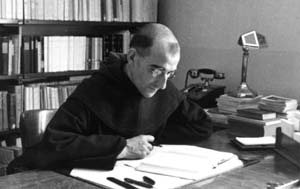This site presents an online version of a special exhibition created by the United States Holocaust Memorial Museum in Washington, D.C. The exhibition focused on the actions of Father Jacques, a Carmelite friar, who hid several Jewish boys in his school in Avon, France. This exhibition was on display from April 11–October 14, 1997, on the lower level of the Museum.
|
FATHER JACQUES
|
|
During the Holocaust, relatively few people rescued Jews in German-occupied Europe. Indifference, antisemitism, and fear all deterred rescue efforts. But among those risking imprisonment and even death to save Jews were individual Christian clergy, who hid thousands of Jewish children in religious institutions or with willing families. In Belgium, Father Bruno, a Benedictine monk, rescued more than 300 Jews; in France, the Protestant pastors André Trocmé and Edouard Theis worked with local villagers to shelter several thousand Jews in and around Le Chambon-sur-Lignon.
|
 |
Father Jacques working in his office in Avon. Date unknown. Photograph courtesy of Couvent des Carmes, Avon, France |
|
|
No less celebrated are the acts of Father Jacques de Jésus (born Lucien Bunel in 1900), a Carmelite friar and headmaster of the Petit Collège Sainte-Thérèse de l ' Enfant-Jésus. Angered at Nazi policies, Father Jacques made the boys' school in Avon, France, a refuge for young men seeking to avoid conscription for forced labor in Germany and for Jews. In January 1943, he enrolled three Jewish boys — Hans-Helmut Michel, Jacques-France Halpern, and Maurice Schlosser — as students under false names. He also hid a fourth Jewish boy, Maurice Bas, as a worker at the school; sheltered Schlosser's father with a local villager; and placed the noted Jewish botanist, Lucien Weil, on the school's faculty.
|
| The photo shows Maurice Schlosser (standing, bottom left), one of the hidden boys, with his classmates on the rocks of Avon. 1943. Photograph courtesy of Couvent des Carmes, Avon, France
|
 |
|
|
Informed of the Carmelite friar's activities, the Gestapo seized Father Jacques and the three Jewish students on January 15, 1944. Weil, his mother, and sister were arrested at their home that same day. On February 3, 1944, German authorities deported the boys and the Weil family to Auschwitz, where they perished. Father Jacques was imprisoned in several Nazi camps before being liberated by American troops at Mauthausen in early May 1945. Suffering from tuberculosis and weighing only 75 pounds, he died several weeks later.
In 1985 the Israeli Holocaust remembrance center, Yad Vashem, posthumously honored Father Jacques as one of the "Righteous Among the Nations." Two years later, French filmmaker Louis Malle paid tribute to his former headmaster in the film, Au revoir les enfants.
|

